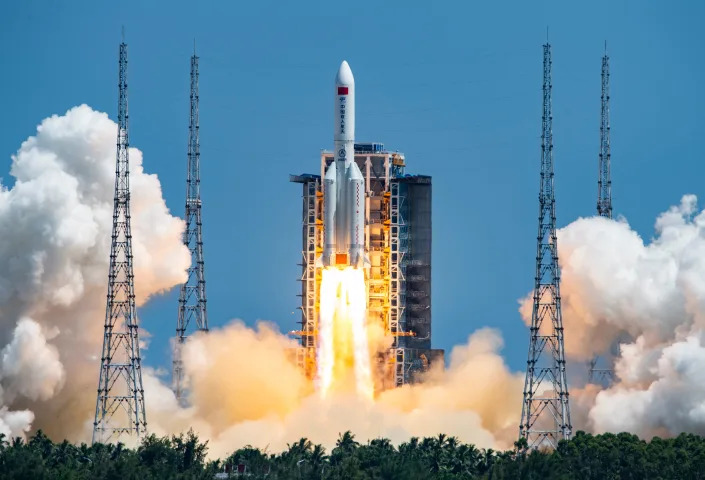China's New Space Station Has a Big Role to Play—Scientifically and Diplomatically
Jeffrey Kluger Mon, September 12, 2022
The rocket carrying Chinas second module for its Tiangong space station lifts off from Wenchang spaceport in southern China on July 24, 2022. Credit - CNS/AFP via Getty Images
When the International Space Station (ISS) goes out of service in 2030, low-Earth orbit won’t be empty of cosmic labs. Already flying—if only partially constructed—is China’s two-module (soon to be three) Tiangong space station. Compared to the 16-module ISS, China’s orbiting platforms is a modest machine, but as Popular Science reports in a story that nicely frames China’s overall ambitions in space, Tiangong has a big role to play.
The station’s third module, known as Mengtian (“dreaming of the heavens”) measures 59 ft. (18 m) long and 14 ft. (4 m) wide and weighs-in at 20 metric tons. Set to launch before the end of 2022, it will join the Tianhe core module and the Wentian experiment modules, already in orbit.
More from TIME
Like the ISS, the T-shaped station will be equipped with a robotic arm. That could give Tiangong the capability to help service and support Xuntian, China’s first space telescope, scheduled to launch within the next two or three years. Xuntian will fly in low-Earth orbit, giving it more in common with the Hubble Space Telescope than the James Webb Space Telescope, except it will have a field of view up to 300 times greater than Hubble’s.
Meantime, while the U.S. and China don’t cooperate in space the way the U.S. does with Russia and 13 other space station partners, China is opening up the Wentian module to potential experiments other countries around the world might want to fly. All told, Wentian is expected to be capable of running over 1,000 experiments over the course of Tiangong’s yet-to-be-determined lifespan. That could make Tiangong as much a tool of diplomacy as of science.
The station is “very attractive to a lot of international partners that don’t have such comprehensive space programs,” Alanna Krowlikowski, a political scientist at the Missouri University of Science and Technology, told Popular Science. As the U.S. cedes the space station market to other players, China is ready to rush in.

No comments:
Post a Comment